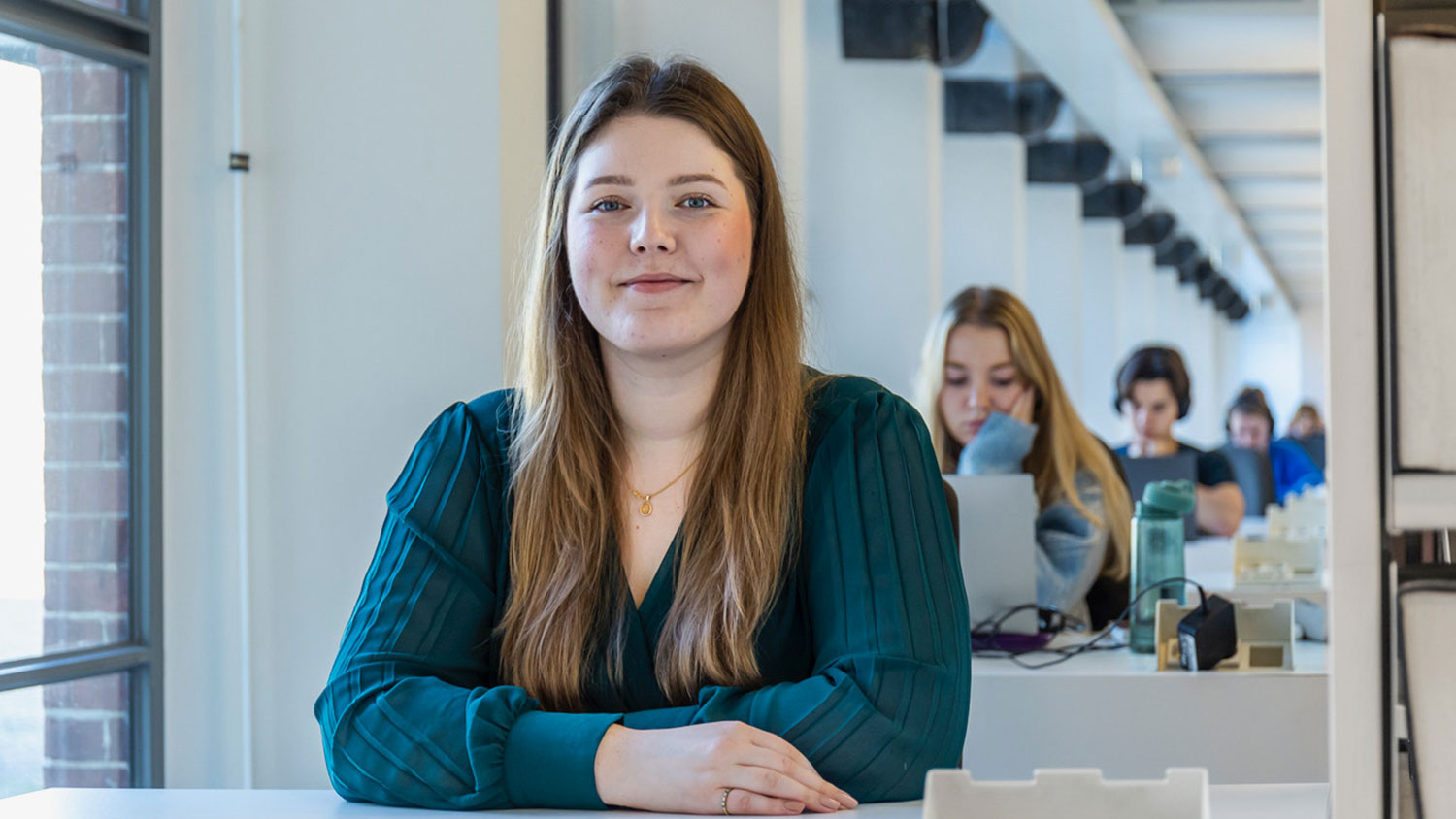Financial investments becoming more and more popular among students

Nearly half of all people between the ages of 18 and 30 engage in some form of investment practice in the Netherlands, according to financial information provider Nibud. Thirty-one percent of them invest traditionally and 27 percent invest in digital products such as cryptocurrencies. Now, with prices rising, the highest inflation in 40 years, savings accounts yielding no gains, and student loans being offered with zero percent interest, investing seems more and more appealing to the “lost generation”. No wonder, then, that an increasing number of students are trying their luck at investing.
Student investment clubs
Jornt Haarman, treasurer at ECU’92, the association for Economics students, has indeed noticed a growing interest in the association’s investment club, Beleggingsvereniging voor Kennis ("Investment Association for Knowledge", best known as the Dutch acronym BvvK). At present, only Economics students are allowed to join the club, but the board is considering introducing a regulation that would allow students from other programmes to join too. “We’ve received applications from students of Veterinary Medicine, Psychology and Law, for example. There is a great deal of enthusiasm. Apparently, we are the only student investment club in Utrecht,” rejoices Jornt.
Marinus Grootveldt is a member of ECU’92’s investment club. He says they currently have 28 active members, ten of whom meet every Monday to discuss share options. New members put in 50 euros and, from then on, pay 15 euros per month. That money is then collectively invested in a package of shares to spread the risk. If a member misses a meeting, his or her vote will not count in the decisions that are made. “At the moment, our profits are around 20 to 25 percent”, says Marinus. “Some months, we suffer losses, but that’s generally compensated in the long term.” When a student leaves BvvK, they get their investment back plus the return.
 BvvK members in 2018. Photo: courtesy of the club.
BvvK members in 2018. Photo: courtesy of the club.
Spreading the risk
Tera van de Veen is a Psychology student who invests about 150 euros per month, but investment clubs are not her thing. “I think one develops a kind of tunnel vision when they join a club, so they don’t do as much research themselves.” Many of her friends are interested in investing as well, but she doesn’t know many people who actually do it. In addition, those who do are mostly men. “That’s a shame”, laments Tera. “Research has shown that women often achieve better results on the market. Women take more time to make decisions, whereas men tend to take action faster. Like: 'the price is going down so we’re selling it all'. That's why I want to encourage other women to give it a try. But do make sure you read up on it first!”
Tera invests in ETFs, which is short for Exchange Traded Funds. Through such a fund, the investment – and therefore the risk – is spread over a bunch of companies called an index. To reduce her risk, she opted for an index comprising only sustainable companies and another one with 3,500 of the largest companies worldwide. Although reading up on all the different options and finding the right indexes took up a lot of her time at first, she currently spends only half an hour a week investing. “Because I invest in ETFs, I don’t have to worry about that. Given the low risk and low profit, I can safely participate in the market.” This way, she expects to learn the ropes of investing, which will come in handy later when she’ll earn more and be able to put in larger sums. Still, last year’s return on her shares was not bad at all: about 7 percent.

Investing your student loan without worries
The return she gets on her ETFs is not enough to tempt Tera to invest with borrowed funds, so she only uses part of the income earned with her part-time job to do this. She does borrow money from the Education Implementation Service (DUO, the Dutch institution responsible for student loans, Ed) but she borrows as little as possible, only so she is able to support herself. “Investing with debt used to be foolish because of the high-interest rates on student loans. Not anymore. Still, I personally feel that’s too risky because you can never be sure that you’ll be able to pay it back.”
Nevertheless, 9 percent of students invest with money obtained from student loans, a recent survey conducted by Nibud shows. Johan is one of those students. A student of Energy Science, he only started borrowing money during his Master’s degree, with the sole purpose of investing it. He did not need DUO money for his living expenses, as his side jobs and the financial support from his family sufficed to support himself. That’s why he can use the entire sum borrowed from DUO to make investments. His parents are not disappointed with Johan’s choice to contract debt. “They wanted to give me the opportunity to graduate debt-free. They say that what I do with the money is my own responsibility.”
Johan never worries about his loan. “I see it as an investment in the future because I immediately invest everything I borrow. Relatively speaking, my debt isn't even that substantial, because I only started borrowing money during my Master’s. Of course, there is always a possibility of making a loss, but I’m happy with the risk-reward ratio. Moreover, the high inflation rate also works the other way round, which means that my debt is rapidly decreasing in value. Besides, I have plenty of time to pay it off – and to get a good return too. When you have such a long-time horizon, you’re basically guaranteed to make a profit.”
Indeed, this proved to be true for the members of another investment club called The Young Utrecht Student Investment Association, which was founded in 2012 and only survived three years. According to a former member who wishes to remain anonymous, the club's short lifespan was not so much due to bad investments, but rather because some of its most active members started working for financial institutions, so they were no longer allowed to participate. The investments he made with his student loan at the time have yielded good returns since then: his shares are now worth twice as much as his student debt. “Still, I advise caution”, he says. “When the rates fell drastically following the Covid-19 pandemic, my investment portfolio lost 13 percent of its value in a single day. Another blow like that and I would have had to sell my shares at the worst possible moment to avoid losing everything. After all, when you have student debt, losses count double.”
 Traditional investments vs. crypto
Traditional investments vs. crypto
Master’s student Johan started out by investing in traditional shares in an investment fund managed by the bank. The money was then invested by the bank’s own experts. As Johan gained more experience, he started to choose his own shares by researching the targets and balance sheets of various companies. Therefore, a large part of his portfolio consisted of sustainable energy stocks. He is an Energy Science student, so he tried to use his expertise to gain an edge on the rest, for instance by knowing which solar panel companies had the most potential.
However, in early 2021, when the stock markets suddenly became very unstable, with significant fluctuations, Johan started investing in cryptocurrencies. “The share prices skyrocketed and I thought to myself 'For how long can this boom go on?' I didn’t trust it. And sure enough, in April, it all crashed down. It was a huge blow to my portfolio. That’s why my focus started to shift toward cryptocurrencies. I see a lot of potential in it. Of course, it’s also a bit more exciting and addictive because of the large fluctuations and the chance of extremely high profits or losses – it’s a lot more volatile.”
At BvvK, they do not dabble in crypto at all. They have done so in the past, but they are a non-profit foundation and from a taxation point of view, investing in cryptocurrency poses problems. “Personally, I don’t support it either, because I can’t substantiate the value to myself”, says Marinus. “There are no underlying factors such as real estate, intellectual property and turnover that can help me account for the current prices, or indeed, any prices higher than 0. That’s why I think it’s very risky and that people tend to think too lightly and easily of it. Moreover, our aim in investing is to learn from it, not to get rich fast.”
Finfluencer
Finfluencer (or financial influencer) Emma Mouthaan, whose Instagram account @skere_student has 5,000 followers, is also careful with crypto investments. She does believe in its future and applications, but she is not yet ready to invest large amounts of money in it. “I don’t really understand it yet. I have to finish my Master’s thesis now, so I don’t have a lot of time to do research on it and read whitepapers about it.”

Emma Mouthaan. Photo: Angeliek de Jonge
On her Instagram account, Emma talks about her experiences with investing and gives tips to students. One of the students she has inspired to invest is Tera. Lately, Emma has been getting a lot of interview requests — she has noticed that ever since the pandemic, interest in investing has increased a lot. She herself is a big fan of passive investing, i.e. investing in ETFs and index funds. “You can’t really go wrong with that. You just have to delve into it once, learn the basics, and then it’s just a matter of making a monthly deposit. You basically don’t have to worry about it ever again.” According to Emma, women are more successful with shares than men because they tend to invest passively. “Men really see it as a hobby, analysing companies and making specific trades instead of investing in indexes. That means taking more risk.” Therefore, Emma thinks it’s best not to monitor the rates too much.
Mistakes that will cost you dearly
Johan had to learn this the hard way. “When the stock markets crashed because of the pandemic, I panicked, and in my brilliance, I decided to sell everything at a loss. Later, the prices just went back up again. I learned a lot from that.” But what is it that you can learn from losing money, exactly? “That you have to keep your head cool at all times,” says Johan. “If your share prices fall, but you have faith in the value and structure of the company, you can even see it as a ‘discount’ and buy additional shares.”
Tera also made a major mistake once, even with her defensive investment strategy. “In the beginning, I once sold shares at a loss when the prices were falling. A week later, the rates were up again and I was really disappointed. Investing and emotions don’t mix. It’s frustrating to lose money every day for a whole week. That’s why I don’t look at the prices so much anymore.”
Morals
Although Tera does not invest with money obtained through student loans, Emma, Johan and Marinus do invest DUO money in their shares. Something some politicians frown upon, arguing that investing is not what student loans are intended for: they're supposed to be used to cover living expenses and study costs. For example, according to members of Parliament René Peters and Inge van Dijk, both from the political party CDA, this way of investing makes rich students even richer, therefore increasing inequality among students. That's why they question the morality of this practice.
Maurizio Montone, Assistant Professor in the Economics department, refrains to make moral judgements on this issue. “Is it morally right that there is a 'lost generation' in the first place? Let’s try to create a level playing field for the younger generations first. Only then can we talk about moral issues.”
However, Johan does agree that it is not entirely fair. “I am well aware that I’m using the loan in a way it’s not meant to be used. It may be a selfish opportunity, but I think it’s too good to pass up.”
Marinus feels no ethical responsibility towards the government or his fellow students who have to borrow the money just to get by. “The system was set up on the basis of many promises that the government doesn’t honour. For example, the basic student grant was scrapped with the justification that the money that was previously used for that purpose would then be invested in improving the quality of higher education. In practice, however, it was effectively a budget cut. In addition, politicians said that student debt would not be registered by the Credit Registration Office (BKR in the Dutch acronym), but there are plenty of indications that this will be the case in the future. What's more, you’re expected to mention your student debt when applying for a mortgage. The government also proposed to tie the interest rate to the 5-year government rate instead of the 10-year rate, even though it’s always a bit higher. I don’t think they’re being very ethical themselves.” Despite all these observations, however, Marinus says he does not want to encourage other students to follow his example. “Ultimately, you are the one who bears the risks. Only invest money that you can lose without getting into trouble.”
In an earlier interview with radio show BNR, Emma said she thinks the moralistic counter-argument is unjustified because other students spend the money they borrow on parties, beer and holidays.